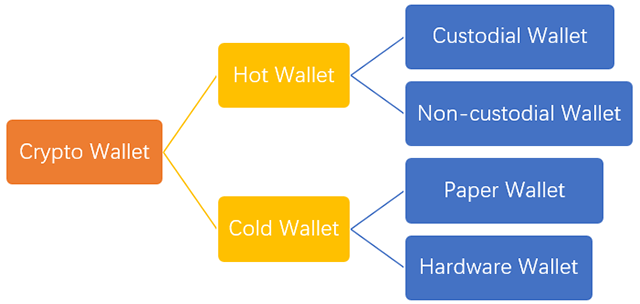Fiat currencies
Crypto Currencies
No results for ""
We couldn't find anything matching your search.Try again with a different term.
What Is a Crypto wallet?
What Is A Cryptocurrency Wallet?
A cryptocurrency wallet is a physical device, PC program, smartphone application, or online service that stores public and private keys for multiple or single digital cryptocurrency transactions. It also comes with the function of bills and balances inquiry. Some crypto wallets also provide the services of encrypting and/or signing information. In a way, it is similar to a bank account that without an intermediary, just like a bank account that is used to manage your fiat money, a crypto wallet can be used to manage your digital assets.

How Does a Crypto Wallet Work?
A crypto wallet follows a certain algorithm standard of cryptocurrency's technology, generate a series of theoretical or random number. Then the number base on the cryptocurrency cryptography algorithm requirement to generate a private key, which is for accessing and sending cryptocurrency. With a certain private key, a crypto wallet can generate a public key for receiving cryptocurrency. Meanwhile, it can also generate an address by the public key, user can use the address to get cryptocurrency from a third party. As a matter of fact, the basic function of a crypto wallet is to store keys, the cryptocurrency itself is not in the wallet they are decentrally stored and maintained in a publicly available distributed ledger called the blockchain. In simple terms, a crypto wallet is an application for you to connect to the blockchain and manage the cryptocurrencies that belong to you.

How Many Types of Crypto Wallets? Which Kind of Wallet Should I Use?
Theoretical, cryptocurrency wallets are mainly decided into Hot Wallet and Cold Wallet.
A hot wallet refers to an online wallet that connects to the Internet and allows users to use crypto to pay their bills at online and brick-and-mortar stores or exchange cryptocurrencies instantly. If we consider who is in control of the wallet, the hot wallet can be sort as Custodial Wallet and Non-custodial Wallet.
- Custodial Wallet: It is a wallet that a third party keeps your crypto for you, which means you do not get to store the private keys with you but only get the address of the wallet to deposit funds. Store your assets in a custodial wallet just like you store your fiat money in the bank. Even though you own the crypto, but you can't get full control of the crypto and may face the risk that the facility shut down and you can't withdraw the assets. The best example of custodial wallet is exchange wallet, after you set up the exchange account you will get access to a crypto wallet, with this wallet you can Buy or transfer crypto in the exchange easily.
- Non-custodial Wallet: It is a wallet that you can get full control of your funds. You own the private key and each authority about your crypto assets. There is no third party to custodial your assets if you use the non-custodial wallet. However, the responsibility of remembering the password or seed phrase will fall to the users. If you forget the password or seed phrase, you may completely lose your funds. Additionally, users can use a non-custodial wallet to participant in other crypto activities, such as yield farming, borrowing, staking. etc. Also, there are several types of non-custodial wallets, such as full node wallets, Light wallets.
A cold wallet refers to an offline cryptocurrency wallet that stores the private keys to your cryptocurrency funds in a more secure way. It can avoid having your funds exposed to cryptocurrency hacks and thefts. If you don't need to transfer your funds instantly, you can choose to use a cold wallet. Hardware wallets andPaper Wallets are cold wallets.
- Paper Wallet: It is simply formed by using a program to randomly generate a public and private key offline and you can print them on a piece of paper, which you then store and save in a secure place. The keys are printed in the form of QR codes which you can scan in the future for all your transactions.
- Hardware Wallet: Hardware wallets are physical devices where you can store your cryptocurrency. Your crypto addresses and keys can be kept in a USB drive device, and only the person who possesses the USB drive can access the assets.

Also, if consider the platforms that wallet supported, crypto wallets can sort as Desktop Wallet, Mobile Wallet. As for the number of coins that the wallet support, it can be divided into Multi-asset Wallet and Single-asset Wallet.
There are many ways for you to store crypto assets. If you frequently transfer funds or making investments in cryptocurrency, a custodial wallet is suitable for you. If you consider asset safety and want to take part in advanced crypto activities, you may choose a non-custodial wallet. To keep your assets in store for the long term or you need to take extra precautions, a cold wallet is your best choice.
How to Secure Your Crypto Wallet?
- Don't share your private keys, seed phrase, and password with others.
- Don't keep most of your assets in a custodial wallet for the long term.Access your wallet offline when you can.
- Always use a strong password and all available security measures.
- Never trust mining or wallet software that comes from a source that you don't know and trust. Visit officials' websites to download and install wallets.
What Is the Best Crypto Wallet?
There are no certain answers that which kind of wallet is best. We list some wallets that are well-known as references for you.
- Exodus: A desktop and mobile wallet with a very simple user interface and an exchange built-in.
- Electrum: An open-source wallet, allows its users to set custom transaction fees, and has the option to choose between legacy Bitcoin and Segwit.
- Ledger Nano X and Trezor Model T: Cold wallet with security features.
Stay tuned to CoinCarp Social Media and Discuss with Us:
X (Twitter) | Telegram | Discord | Reddit
Download CoinCarp App Now: https://www.coincarp.com/app/
$30,000 Deposit Blast-Off
Sponsored
Earn up to $30,000 when you make your first deposit and trade on Bybit! Register Now!